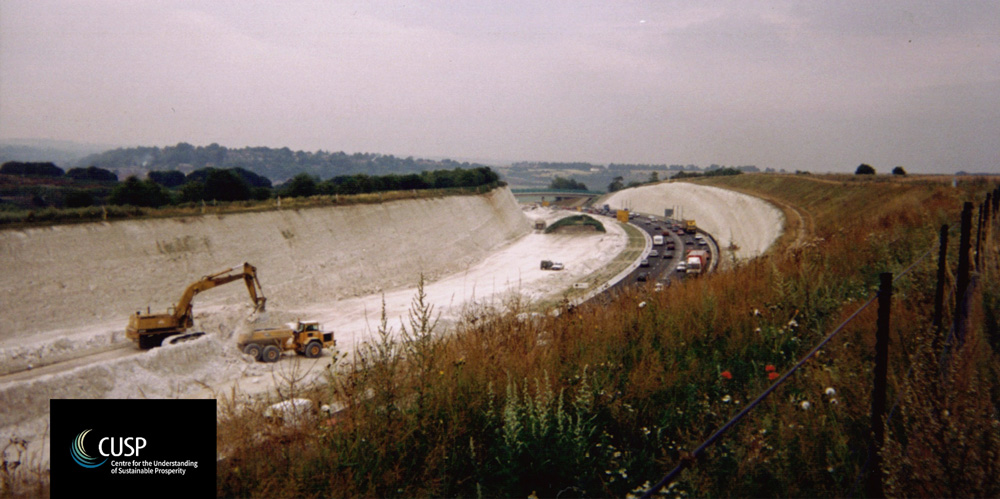Imprisoning a Poet
Emma Must was a Library Assistant in the early 1990s when she got involved in a campaign to stop a motorway extension being built through Twyford Down. Along with six other people, she was sent to prison for trying to save the hill where she played as a child. In this blog, Katy Glassborow is reflecting on her interview with Emma for the climate parenting podcast series.
Blog by KATY GLASSBOROW

For most campaigners physical protest is a last resort, needful only when other means of protest are exhausted. Overt moves to quash this freedom are well evidenced by a flurry of recent anti-protest legislation like the Policing, Crime, Sentencing and Courts Act of last year, and the Public Order Act of a few weeks ago. The UK is now the envy of repressive regimes worldwide.
Yet this betrayal of our democratic rights has been many years in the making. Let’s scroll back three decades. Emma Must is a young university graduate, a would-be poet working as a Library Assistant. Commuting to work, she gazes out of the train window. She’s alarmed by what she sees. And in a few short months, her life will be turned upside down. She will be criminalised and branded an eco-terrorist for trying to walk on, and save, the hill where she played as a child. This is her story.
They say that good people can’t do nothing when bad things happen. It’s just surprising to realise they were referring to you. The year is 1992 and we find a twenty-something poet Emma on a train from Southampton to Winchester, where she works. Fresh back from Leeds where she’d graduated that summer with a degree in English, Emma began to notice changes to the landscape of her childhood as it flashes by during her daily commute.
She’d been aware of plans to gutter out a stretch of hilly chalk downland on the banks of the River Itchen in Hampshire, in order to extend the M3 motorway. These plans had met with years of local resistance, opposition, public inquiries. A petition had even been taken to the European Commission. Had none of that worked?
Days rolled on. Emma kept looking out of the train window. Holding vigil. She noticed the grass disappearing from the top of the magnificent chalk hill. This grass scalping meant preparation for bulldozers. Preparation for the deep incision of nature, the drilling down, and the application of scalding hot tar for a road.
Wait. How had this become a foregone conclusion? Emma stepped off the train, devastated but on a mission to find whether there was anyone who still believed in stopping a motorway being built through paradise.
She asked around. Most people thought there was nobody still campaigning. She spent a whole week making calls. Then – a lead. Here’s a number: ask for the Friends of Twyford Down. A fellow poet told her to walk up the hill. There are people there. The Dongas tribe, named after the ancient trackways on which they were living. They’ve made their home on the hill, attached themselves to the landscape with willow and hazel and tarpaulins, blended in with it so as to claim it for nature. This landscape was not for destroying. Not as long as they are there, physical protectors. Emma said, “What are we waiting for? Let’s go.”

Yellow Wednesday
For Emma, finding comrades was a heady relief. Other people who saw the madness as she did—who understood the recklessness of dissecting nature, ploughing it up for the sake of an endless drone of cars. People who felt as keenly as she did and had no other choice but to stand up against destruction. Some of these people wore suits to day jobs, others were camping on the land.
Emma was drawn up the hill, up the ancient chalkland. She joined the protesters because she had no choice. She had to try and stop the road. She could not bear watching what was being done to the place where she grew up.
She joined the campaign with gusto, hatching plans in the Friends Meeting House in town and then trekking up the hill to be with the Dongas tribe. These impossibly brave people.
Before any of them knew it, it was 9 December 1992. The Department of Transport arrived at dawn with bulldozers and security guards dressed in yellow fluorescent jackets. They came onto the hill to evict the protestors and set up a rival encampment as preparation for the initial phase of construction work. It became known as Yellow Wednesday because of their hi-viz jackets, and it served as a turning point.
It was clear that words had become futile—pieces of paper, petitions, inquiries. All that was left now were bodies. Hands, feet, arms and legs. Physical resistance. Camped out. Staying put. Not budging, not complying. Laying claim to this beautiful land. From that point on there were mass demonstrations and direct actions. Physical barricades—anything to stop the bulldozers from gouging out the hill.
Twyford Seven
There was growing incredulity from government agencies at the nerve of the protestors, matched by growing fascination in the media. Who are these people! What do they think they are playing at! Protestors were interviewed, pictures made it into newspapers, the TV news. By the summer of 1993 Emma was fully aware that she was being watched. The Department of Transport had hired a private detective agency to build a file on each campaigner, documenting their activities, noting their whereabouts.
Then one summer evening, a young man in a white sportscar dropped a dossier of photos featuring Emma on the doorstep of her flat in Southampton. She recalls he had a jaunty manner about him. Emma was shaken—it was midnight and she lived alone. This didn’t happen to people like her. She was a Library Assistant, for Goodness’ sake. Doubts played on her mind—was this all going too far?
The protestors were facing a High Court injunction to stop them walking on Twyford Down. They talked it over—to break an injunction was a risky move. Who could afford to be sent to prison? Emma stepped forward. Me, she said. But no shame or recrimination for those who didn’t feel able. People had families, careers, kids. Not many could afford the cost.
Making it a criminal action – to walk on the hills of her youth – forced a kind of clarity for Emma. Not to defy the injunction felt like saying, it’s okay for this road to go ahead. So Emma and a few others printed out their personal action file numbers which had been attached to their dossiers. They emblazoned them across their chests, and standing shoulder to shoulder, crossed the fence on 4 July 1993.
Quiet victories and noisy defeats
Emma was among seven activists to be sentenced to a month in prison. They were now known as the ‘Twyford Seven’. A kind of fame, perhaps. An uneasy notoriety. As far as Emma is aware, that was the first time anyone had been jailed for environmental protest in the UK since a mass trespass in Derbyshire in 1932.
The Twyford protest did not, ultimately, prevent the motorway extension being built. But it had started something that would become impossible to contain. Twyford had been one of more than 600 road expansion schemes detailed by Margaret Thatcher in her 1989 ‘Roads for Prosperity’ White Paper, as part of what her government described as the biggest road building programme since the Romans. It became clear to Emma that this campaign was no longer just about stopping one road through one hill, but a thousand roads through a thousand hills.
Thatcher’s plans would eviscerate protected sites and green spaces up and down the country. And in response to the action at Twyford Down, a grassroots movement against road building was invigorated. National alerts were set up, campaigners put in touch with one another. Alliances formed, actions planned.
Through a process of quiet victories and noisy defeats over the course of the next six years, Margaret Thatcher’s roads program ground to a halt. By 1998 all but 37 road schemes had been halted.
A remarkable victory! Catastrophe averted through physical protest. Through smart, tactical campaigns. People united, flesh and blood, minds and wit, standing in the way of the apocalypse. But it came at a cost. They were exhausted, physically, mentally, spiritually.
Emma’s visceral need to be a poet could no longer be denied. She needed and wanted to cease being an activist, and to refocus on writing poetry—her life’s dream. To stop campaigning against destruction, and to start creating, instead.
Stopping forgetfulness
Emma’s decision to focus on poetry was not an extension of her campaigning. Her need to write came instead from a need to make sense of it all. To bear witness to what went on. To stop forgetfulness, for herself as much as for anyone else. Philip Larkin called poetry verbal pickling and this resonated with Emma. Yes, that’s what she needed to do.
Her book The Ballad of Yellow Wednesday was published last December, thirty years after Twyford Down. She had no inkling—when writing it—that it would arrive in a new crisis. The current imprisonment of climate activists, the current criminalisation of protest. Her poetry—like all enduring works—has a whole set of unintended resonances.
Looking on, Emma sees it all as waves of activity—of activism—of action. Waves of people trying to raise awareness of environmental destruction. New people taking over from those who have gone before them. She likes the way veteran activist Tom Burke describes campaigning as an opera, with different people playing their part in different ways. Activists, lawmakers, NGOs, companies, musicians, authors, educators, parents, all blending together to push for change.
Branded an eco-terrorist and sent to prison in the early 1990s, Emma views the recent shift in perception of environmental issues as progress. She’s encouraged that poets and creatives are responding to the climate crisis, the loss of habitats and species, through ecopoetry and eco-criticism. Like Neil Astley’s anthology ‘Earth Shattering’ and Kate Simpson’s anthology, ‘Out of Time: Poetry from the Climate Emergency’. Simpson has argued that poetry is galvanizing, “the speaker—whether a physical orator or a silent narrator—is capable of pulling readers into an imagined space and rallying a cardinal, immediate response”.
Even though politicians are doing all they can to crush our ability to protest, criminalising the actions of individuals who are doing everything in their power to stop nature being destroyed, there is hope. A groundswell of poets rising up. Emma stands among them, watching with interest, with long and hard experience. With certainty that poetry can be a clarion voice in the fight for climate justice.
Toll, by Emma Must
Saturday 22 May 1993
We pulled away the razor wire, pushed the fencing
flat, and we were in, then up, then on, all
two hundred of us, swarming above the valley
on the girders of their Bailey bridge.
All night we banged out rhythms with whatever tools
we had to hand: we made the metal sing,
brought forth a chime, a knell, a toll,
a resounding reverberation, a peal;
with measured strokes we struck the bracing
frames as if they’d been cast from bell metal.
From beneath our huddled silhouettes, all
across the landscape you could hear the bridge
finding the colour of its voice, rejoicing.
The toll rings out across the valley still.
Podcast
- To listen to Emma on the podcast Mum, Will the Planet Die Before I Do?, please see our podcast page.
Links
- UN Human Rights Chief urges UK to reverse ‘deeply troubling’ Public Order Bill: https://www.ohchr.org/en/press-releases/2023/04/un-human-rights-chief-urges-uk-reverse-deeply-troubling-public-order-bill
- The coronation arrests are just the start. Police can do what they want to us now: https://www.theguardian.com/commentisfree/2023/may/12/coronation-protest-arrests-police
- Liberty launches legal action against home secretary for overriding parliament on protest powers: https://www.libertyhumanrights.org.uk/issue/liberty-launches-legal-action-against-home-secretary-for-overriding-parliament-on-protest-powers/
- The Twyford Down M3 protest of 1992 in pictures: https://www.theguardian.com/world/gallery/2012/sep/28/twyford-down-m3-protest-pictures



